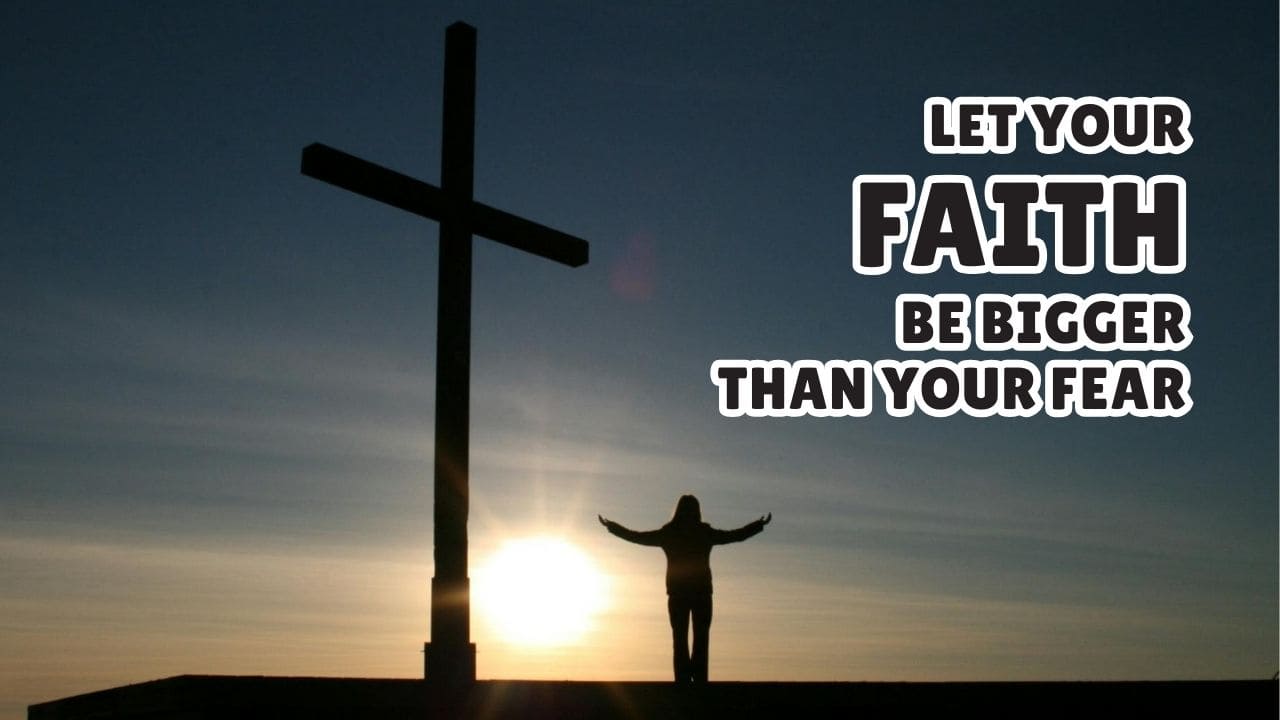Let your faith be bigger than your fear – meaning and explanation
The phrase in discussion can be understood better by breaking it into two. The first part stresses the need on believing or trusting in something, perhaps a higher being, while the other part encourages one to refrain from worrying or getting scared. Here’s a breakdown:
What It Means?
- Faith: This a feeling that concerns itself with trust, or hope, or confidence in something. It could be hope in God, or in someone or even oneself.
- Fear: This entails feeling scared or worried with regards to something that may or may not be real.
The Message
- Everyone at some point has gone through the period of anxiety and crisis, but rather than letting the fear consume you, have faith in yourself or in what you are seeking.
- The implication then being when your belief is greater than fear, it implies you are prepared to do whatever is necessary in order to encounter whatever it is that disturbs or bothers you.
Why It’s Important?
- It is fair to state that a strong dose of faith will provide you the strength to pursue the right course of action without fear standing in your way from achieving the goal.
- It provides one even more strength so as to pull through and keep going even when the circumstances can only be described as rough.
In Short
Have more trust than anxiety about the uncertainty that life offers and this statement “Let your faith be bigger than your fear” is a clear articulation of that thought. It serves as an effective tool to deal with several questions in life and to be at peace with one self.
Who said let your faith be bigger than your fear?
“Let your faith be bigger than your fear” is a statement that has been quoted and reproduced, and apparently has no single author. It has been widely embraced in different spheres as a religious quotation as well as a motivational saying. It stresses on the need to have faith rather than letting oneself be overwhelmed by fear.
Many people, such as writers, speakers and even ordinary folk, have spoken in narratives as well as sermons that detail their experiences with this phenomenon sometimes even intertwining with their lives of faith and trust in God.
In other words, there was a writer who during a sermon which leads them to transform the way they see their life and the steps they take recalls how the fear that engulfed them was overcome by faith. Such an expression is however not reserved for Christians only but, is widely used across the world even beyond faith.
Interpreting “Let Your Faith Be Bigger Than Your Fear”
This phrase provides reassurance that belief takes precedence over anxiety. This notion is especially widespread in the religious and motivational context when people talk about faith as an omnipotent source when dealing with adversities of life.

Image Credit: Pexels, MART PRODUCTION
Fear Against Faith: An Infinite Conflict
Fear is an innate, universal response to perceived threats, danger or uncertainty. It triggers an emotional response and can manifest itself as the fear of failure, fear of loss, or even simply the fear of the unknown. On the other hand faith can be described as a perpetual trust or fully manual control, often in god or goodness in life. Time and again, the conflict of faith and fear has been documented in innumerable spiritual discourses.
Biblical Foundations
Psalms 56:3 and other verses provide motivation to overcome fear and instead trust in God which allows to maintain a positive image of life. This portion of scriptures demonstrates several distinct Biblical aspects: Such as:
- Proverbs 3:5-6 Trust in the Lord with all your heart and lean not on your own understanding.” This excerpt centers around looking towards God’s wisdom instead of one’s understanding.
- 2 Timothy 1:7 teaches us that “God gave us a spirit not of fear but of power and love and self-control.” This suggests that fear is something that can be conquered through faith.
These examples demonstrate the same point, faith is capable of providing strength when life gets rough at any time.
Practical Applications
1. Fear Acknowledgment: Any fear has to be understood and confronted before it can be faced and combated. Fear can often be a source of anxious situations and complications so instead of ignoring it, try expressing your apprehensions in order to know them better.
2. Stirring Your Faith: That is how one can burn food while cooking. Faith is not passive as some may think and needs to be stirred which may include:
- Prayer: One gets in touch with God and has faith built up in her or him.
- Scripture Reading: One can find peace and comfort in the reading of the biblical text.
- Community Support: Being around people who are faith reinforcing is also helpful.
3. Focus on God’s Promises: On the contrary, when feelings of fear arise, an excellent treatment is faith promises that have been made in the past. For example, believers find comfort in the words that say “I know the plans I have for you” from Jeremiah 29:11, which speaks about a future.
4. Action Over Anxiety, Even During Trepidation: In many instances, individuals may seek small achievements in order to pluck up the courage to go against their fears. This connects to the belief that faith is active – that you trust God will help you when the situation becomes insurmountable.
The Role of Community
The community also has an important impact in turning away fear and replacing it with faith. It is often helpful to talk to other people who have gone through the same fears in order to receive encouragement and perspective. The power of telling a story works particularly when the motivation is faith. It helps people to understand that they are not the only ones in that predicament.
Must Read,
✔️ What are the Places to Visit Near Tirupati Balaji?
✔️ Karungali Malai Original: How to Use, Benefits, Prices
Conclusion
The phrase “Let your faith be bigger than your fear” has a deeper meaning and serves as a guide to those who are filled with anxiety and encourages them to build trust in God. It starts with recognition of the fears, practice of faith, forgetting history and remembering what God promises, and seeking the help of time and other people. This advancement of vision shifts the focus onto faith, consequently, fostering more peace and greater strength in the face of adversity.
Targeting one’s focus in such a way enhances not only the fulfillment of individual goals but also strengthening of one’s relationship with God and with others.
Frequently Asked Questions (FAQs)
How can I make my faith stronger than my fears?
To deepen your faith more than your fears, create a healthy schedule that incorporates time for prayer and even meditation. This practice not only allows you to surrender your worries to God but people’s anxiety and fears are also alleviated. What is more, add positive forces to your life, such as friends or members of a society that encourage your faith, or read books and watch videos that strengthen your faith, like the Bible or motivational videos.
How can I balance faith and fear in my life?
Having a faith and a fear is one and the same thing, so long as you clearly understand where the fear germinates and choose to focus more on faith instead. Reminding oneself about God’s promises through the Word and prayer can encourage faith and subdue fear. When battling fears ask yourself, what is the worst? And what is the best? This alone can lower anxiety and enhance your faith.
What are some examples of faith overcoming fear?
Real life example of faith overcoming fear can be illustrated in several contexts like if a person is going through an ailment they can always count on the deity they believe in to lend them support. Or a person delivering a speech in front of a huge crowd even when they have stage fright can tremble and talk believing in someone, or telling us something that inspires them so much that we wish to be inspired also. All these scenario’s highlight that believing can help us tackle our fears and even be victorious over them.
How can I teach children to have faith bigger than fear?
You can instill faith bigger than fear in my children through narrative and real life illustrations. Talk about biblical characters that dealt with fear with praise and seek to encourage children to speak about their fears. Encourage simple trust affirmations prohibiting limit setting words towards love and engage them in trust enhancing activities like prayer or meditation. This approach assists to build trust and cope capabilities within them.
What are some small steps to take when facing my fears?
When trying to overcome your fears try to break it down into small chunks and gradually get into it. Now this is a form of therapy that basically starts with the simple premise of finding something which can cause one to panic, creating a fear ladder as it is termed, where the least frightening situation is the individual’s social interactions.
A good example of this is if you have a fear of talking to people, then start somewhere small like telling a stranger “hi”, then try to say it repeatedly so that you feel more comfortable. Once that is done regarding each minor situation, with time and will, one will be able to overcome more major fears and that is how confidence builds.
What role does meditation play in strengthening faith?
Meditation is an active protector and enhancer of faith by helping one be and feel calm and serving as a pointer towards reflection. Mindfulness is a skill that one can develop through meditative practices and regular meditation which helps one become aware of his or her thoughts and emotions without critics. Such a perspective enables one to regard and manage fear and anxiety in a more effective manner because practitioners tend to be more observant of their fears instead of acting upon it.
Mediating on breathing and positive thoughts can doubtlessly build intrapersonal faith in god and oneself and bring inner peace in their heart, even hope to anger or distress them to a considerable level.
What are some common mistakes to avoid when facing fears?
First of all, one can totally export his fears by employing avoidance behaviors and rituals. Take-childhood for example. When a child has a fear of the dark, he shies away from situations which might further reinforce the feelings such as sleeping crying or looking for some sort of attention. Together, they do lead to support.
So instead, the right approach in such cases would be to make the child acknowledge that the dark is not something he should be afraid of. Allow him to actively engage with the dark and participate in various activities during the dark so the response is being altered and so are the feelings. This is where we manage our exposure.
What role does breathing techniques play in managing fear?
Deep breathe is a common technique employed to help recollect oneself from such negative emotions or unpleasant situations. Deep breathing gets more challenging when someone is frightened while focusing on the fear response. The blood pressure gradually rises and there is a heart increase, owing to a normal physiological reaction. Immediate deep breathing allows a child to manage fear control which would otherwise resort in her fleeing, this creates a positive feedback effect of the same.
Together with imposing free movements and silence – which automatically gets recorded to the brain as a cue – we would be able to improve Sheldon’s recovery perspective in social events.









